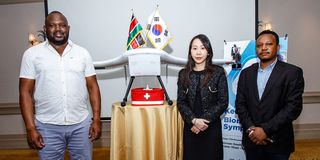Korean biomedical firms eyeing Kenyan market

From left: Mr Cleopa Otieno of Kenya Flying Labs presents the Narma AF200 drone by Narma Inc for cargo delivery at the Korea Biomedical Symposium, flanked by Kotra's Deputy MD, Ms Unjeong KO and Team Leader Mr Matundura Gesora.
What you need to know:
- Kenya is the fourth largest importer of medical devices in Africa, behind South Africa, Egypt and Morocco.
- Date from the UN Economic Commission for Africa shows that Africa imports about $4 billion worth of medical devices annually.
South Korean biomedical technology companies are eyeing the rapidly growing Kenyan market which is being propelled by increased investment by both the government and private sector entities.
On Friday last week, the Korea Trade Investment Promotion Agency (Kotra) hosted the Kenya-Korea Biomedical Symposium where South Korean biomedical technology showcased their advancements in the field, even as Seoul and Nairobi seek to bolster their trade ties in the sector.
“The future of healthcare in Africa depends on innovation. The adoption of new technology can create opportunities to improve health literacy and access to care for all Africans,” said Mr Matundra Gesora, the team leader at the Nairobi Trade Centre of Kotra.
During the symposium, Korean biomedical tech firms GeneAll Biotechnology and Narma Inc, which are Kotra’s clients, displayed their technologies, as well as Microbiology E.A. Ltd, which is a Kenyan company.
Narma Inc is the first spin-off company of Korea Aerospace Research Institute and aims to develop world-standard delivery drones and service platforms.
Through its innovative product, the Narma AF200, an agile tilt motor drone platform for cargo delivery, the drone is used for last-mile emergency deliveries in Tharaka Nithi and Makueni Counties by Kenya Flying Labs, a local drone operator in Kenya.
GeneAll Biotechnology, which has been in operation for over 20 years, provides specialized products and services for advanced molecular diagnostic solutions providers.
The firm has developed nucleic acid extraction products based on GeneAll technologies, with their sample collection kits and reagents being used across the globe.
“The pandemic was a catalyst for growth in health tech on the continent. Now entrepreneurs and the government must sustain the momentum,” said Mr Gesora.
Biomedical technology is big business on the continent, and as Kenya and Africa’s population at large continues to grow rapidly, demand for this technology has shot up in recent years.
Latest data from the UN Economic Commission for Africa shows that Africa imports about $4 billion worth of medical devices annually. This underlines a growth of $1 billion in the last five years, representing about 1.9 percent of global imports.
According to the report, Kenya is the fourth largest importer of medical devices in Africa (2.5 per cent) only behind leaders South Africa (18 per cent), Egypt (12 per cent) and Morocco (8 per cent).
But Mr Gesora warned that Africa’s health systems are suffering from serious inefficiencies, with countries across the continent struggling with disruptions in medical equipment and drug supply chains, last-mile health-services delivery, medical data analysis and storage, and financing.
“Collaborations amongst various stakeholders, including governments, regulators, academia and industry, have the potential to develop solutions to address the diverse healthcare challenges faced on the African continent,” he said.
This comes at a time Universal health coverage (UHC) is one of the Kenya Kwanza government’s key development pillars, following in the footsteps of former President Uhuru Kenyatta’s Jubilee government.
According to the Economic Survey, 2023, the national government’s National total expenditure on health services was projected to rise by 33.1 per cent from Sh88.2 billion in the financial year 2021/22 to Sh117.4 billion in FY2022/23.





